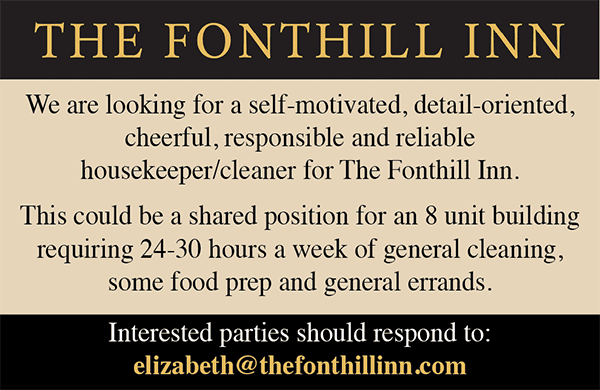Navigating early motherhood with a colicky baby
BY HEATHER BOYD Special to the VOICE
In the early months of parenting I counted my infant’s sleep in minutes. Not hours. Minutes. I wrote down these numbers on scraps of paper in the dark while soothing and breastfeeding my son. I scanned this list of digits, also in the dark, hoping to see some trend, however miniscule, towards longer sleep periods. Hoping to see some indication that he was sleeping longer and, by extension, that I could sleep longer too. If he slept even two minutes longer, maybe something had improved. However, instead of seeing an improvement, I saw a deflating list of double digits that represented wakings that also were numbered in the double digits every night.
These early days of parenting had moments of pure bliss, and smittenness. My baby was healthy, and I loved holding him and soaking him in. The moments of bliss were competing, however, against his needs to breastfeed constantly and to be held till nearly midnight every night. Nights consisted of momentary relief when my baby finally fell into a deep sleep in my arms, followed by near tears on my part at having to choose between competing priorities: go to bed immediately for 30 minutes of sleep, or get ready for bed, leaving me with only 20 minutes of sleep. I dreaded this decision. It seemed cruel that I had to choose.
 My firstborn was, without a doubt, a baby who spit-up a lot. However, the conventional wisdom at the time, reinforced by my professional training, was that spit-ups were laundry problems, not medical problems. And so I soldiered on, assuming this was what “they” were talking about when they said you’ll be tired. I occasionally filled out infant reflux checklists, which had the same questions that I asked parents themselves to fill out when they came to me for their appointments. I ruled out reflux repeatedly based on a “lack of empirical evidence,” despite my nagging feeling that something wasn’t right. I trusted the checklists more than my own instincts. I hadn’t had to rely on instincts to assess a baby before. But I hadn’t had to do this as a mom before either.
My firstborn was, without a doubt, a baby who spit-up a lot. However, the conventional wisdom at the time, reinforced by my professional training, was that spit-ups were laundry problems, not medical problems. And so I soldiered on, assuming this was what “they” were talking about when they said you’ll be tired. I occasionally filled out infant reflux checklists, which had the same questions that I asked parents themselves to fill out when they came to me for their appointments. I ruled out reflux repeatedly based on a “lack of empirical evidence,” despite my nagging feeling that something wasn’t right. I trusted the checklists more than my own instincts. I hadn’t had to rely on instincts to assess a baby before. But I hadn’t had to do this as a mom before either.
These early days were relentlessly exhausting —and the fatigue did nothing for my lofty, if naive, goals to learn to play guitar or do something else in addition to mothering during my maternity leave.
I focused on attachment-based strategies of nurturing and meeting the need —strategies that are foundational for any baby, but perhaps even more critical (albeit less fruitful early on) for babies in pain. But I still wanted to figure out if this was a problem: was this the normal sleep challenges of a typical baby? Or was this something more?
 The challenge of solving sleep issues in infancy is complex. On one hand, there is a general sense that babies who do not sleep well need to be trained to do so. On the other hand, when mothers express concern that there is something wrong, they are often dismissed by health care professionals as worrying over normal baby behaviour—first-time mothers are particularly vulnerable to being dismissed. Add the reality that babies do wake up often, and we have a situation where parents feel they are creating sleep problems and that they are worrying over nothing. All of these approaches miss the point entirely: babies are biologically driven to wake up often. And some babies who wake up often are waking up because they are not feeling right.
The challenge of solving sleep issues in infancy is complex. On one hand, there is a general sense that babies who do not sleep well need to be trained to do so. On the other hand, when mothers express concern that there is something wrong, they are often dismissed by health care professionals as worrying over normal baby behaviour—first-time mothers are particularly vulnerable to being dismissed. Add the reality that babies do wake up often, and we have a situation where parents feel they are creating sleep problems and that they are worrying over nothing. All of these approaches miss the point entirely: babies are biologically driven to wake up often. And some babies who wake up often are waking up because they are not feeling right.
In our case, I was grateful to have training in infant mental health and I knew that, at the very least, it was reasonable to focus on all of the responsive and nurturing parenting strategies I could. Unfortunately, none of the strategies for helping my baby sleep worked, because they were not designed to explore underlying health issues like reflux.
Infant sleep (or the lack thereof) is undoubtedly one of the greatest challenges of early parenthood. A Google search of “How do I get my baby...” comes back with four of the top five hits related to sleep. The only one that isn’t about sleep is “How do I get my baby into modeling.” Those babies must finally have drifted off to sleep and their cherubic faces are begging to be in a magazine.
I have come to believe that infant sleep does not need to be as tough as it is. That even with medical issues underlying sleep, there are cultural factors and sleep myths that make sleep deprivation with a baby more challenging than it needs to be. We tend to believe babies should be sleeping through the night (and falling asleep on their own) much sooner than research suggests. When they don’t sleep through the night we believe that we are making mistakes and that we need to “do something” to fix this. We believe babies are supposed to develop sleep skills at an even pace and never slide backwards on this march towards independent sleep. We believe we need to control our child’s sleep —that somehow we are in charge of “making” them fall asleep. We believe meeting their need for support at bedtime (whether at 6 weeks or 6 years) develops bad habits. We believe in the “slippery slope” theory of child development: that if we make a choice to meet the need, our children will never leave our bed, never sleep independently, and have a sleep disorder as an adult.
So what can replace these myths? If I could go back and wrap my arms around my new-mama self, I would share with her that:
1. Babies have two fundamental sleep needs. These needs are to be close to mama and to wake up often. These aren’t negotiable needs. Trying to eliminate or speed through these needs is like trying to time travel. Theoretically it sounds nice (and I do love science fiction), but there are consequences to skipping out on nature’s plans. Sharing a room with baby for at least the first six months (and ideally 12 months) are the current guidelines.
2. Mama instincts count for a lot. Although it can feel overwhelming, and we feel the confusion of messages that conflict with our instincts, our instincts can often guide us.
3. Support makes all the difference. When we can’t hear our instincts over the background noise of cultural messages or maternal anxiety and depression, a single supportive person can make all the difference. We need someone who will listen, who empathizes, and who can see the whole picture and help us navigate.
4. Time in nature makes sleep better —indeed, makes everything feel better. What has become so clear through my parenting journey is everyone in our family sleeps more soundly when we are camping: we pay attention to the rhythms of nature, and we fall in sync with that. With no electricity, no screen, and very little artificial light, we can reset our sleep rhythms and eliminate some of the factors that make sleep complicated.
5. You are not screwing this up. Meeting your baby’s needs is not destroying your child’s chance at healthy sleep.
6. This is a 1000-day project. It’s easy to get caught up in trying to solve sleep problems tonight. To think that how our baby sleeps today is indicative of how they will sleep in three years. It doesn’t work that way. This is a multi-year project of mistakes and learning, infant development and mama personal growth. Taking the long, slow path allows us to truly lean in to the need at this moment, without fear or reservation.
7. If it isn’t broken, don’t fix it, even if this doesn’t meet the expectations of extended family, friends, or the latest book on sleep training.
8. If it’s not working, change it. If what is happening is frustrating and leaves you feeling resentful, then it’s time to look at changing it. Make the changes needed to respect everyone’s needs, including your own.
9. Little pieces of self-care adds up. Self-care does not need to be a day at the spa, or a girls’ weekend away. Find as many ways during the day to catch a moment of self-care to fill your cup. Taking a slow deep breath before heading out the door, enjoy the moment (even if it is a minute) to prepare a hot tea before babe wakes up. By living in the present and enjoying what is immediately in front of you, it may be easier to relish it in a way that allows you to sustain the feeling of peace and balance.
10. Be the Mama Bear: If your gut is telling you there is something interfering with your baby’s sleep, listen. Even if it whispers uncertainly in the middle of the night. Don’t let your brain get in your way on this one.
Now, nine years later, I have a bright, and empathetic kiddo who...drum roll, please...sleeps well. He prefers to stay up “late,” wishes he had his own room, and, if nighttime family reading lasts too long, he will say, “I’m tired. I want to fall to sleep now.” Magic words to a mama who was worried my kiddo would never sleep. ♦



